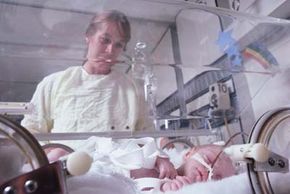Infectious Diseases
Though most common infectious diseases, such as colds and the flu, have no effect on pregnancy, some diseases transmitted by other people may have very serious effects on the baby.
The herpes virus is responsible for frequent, painful ulcers that may occur in the genital areas of both men and women. A sexually transmitted disease, this virus is spread by direct genital contact.
Advertisement
Though this infection rarely causes serious problems in the woman, the newborn baby may become seriously infected and die if she comes into contact with an open herpes ulcer during delivery. For this reason, cesarean section is performed if a woman has a herpes ulcer in the genital region when she is in labor. If a woman knows she has had herpes, it is important that she tell her doctor, so he or she carefully examines the genital area during prenatal visits.
Syphilis is another sexually transmitted disease that may seriously affect the baby. If a mother has an active syphilis infection during pregnancy, the bacteria may enter the baby's bloodstream and cause a variety of abnormalities, including malformations of the heart, eyes, bones, and mouth.
As a part of the routine blood testing of the mother during the first prenatal visit, a blood test to detect the presence of syphilis is usually performed. If a pregnant woman thinks she may have acquired syphilis during pregnancy, she should tell her doctor immediately.
Rubella (German measles) is a common infectious disease that usually affects children. The rash and fever of rubella usually pass within a few days, and complete recovery from the infection is the rule. Rubella infection during pregnancy, however, may have many serious effects on the baby, especially if the infection develops early in pregnancy when the organs of the fetus are just beginning to form.
Complications in the baby may include microcephaly (abnormally small head), mental retardation, seizures, defects in the eyes, heart malformations, and deafness. If a pregnant woman suspects she may have come into contact with someone with rubella, she should report it to her doctor immediately, even if a rash or fever has not yet appeared. The doctor may then perform blood tests to determine if the woman has actually contracted rubella.
Since rubella infection in pregnancy is serious, a woman who is considering becoming pregnant should undergo testing to see if she is immune to rubella. Usually, if a person has had rubella at one time in her life, she never gets the infection again. If a woman is not immune, most doctors advise that she obtain a rubella vaccination before becoming pregnant.
Toxoplasmosis is another infection that may have serious effects on the baby. The mother may become infected with the Toxoplasma organism if she eats infected raw meat or if she is in close contact with cats infected with Toxoplasma. Babies born to infected mothers may have many serious birth defects, including microcephaly, seizures, and other disorders of the brain, and conditions involving the liver, blood, lungs, and kidneys. To avoid toxoplasmosis, a pregnant woman should always cook meat thoroughly and avoid contact with cat litter boxes.
These are all ailments that can occur during pregnancy. On the next page you will learn what conditions to watch out for during labor.
